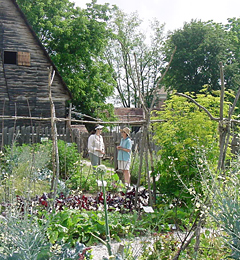Old Stories, New Media
It’s something grade school teachers know intuitively: kids like reading about other kids.
So when a three-year grant from the U.S. Department of Education’s Teaching American History
program brought together Anne Arundel County Public School teachers, Historic London Town and
Gardens and UMBC’s Center for History Education, the group came up with an idea: what if the teachers
researched and wrote about children who actually lived at the historic site?
The rest, literally, was history. The result: Children’s Lives at Colonial London Town: The Stories of Three
Families, a digital storybook and interactive website that is a resource for educators.
“None of us imagined that it would be what it became,” said Lisa Robbins, the director of education at
London Town. “We’re all so proud of and blown away by the finished product.”
Although the CHE has a track record of successful partnerships with teachers, this project was uniquely
ambitious. The research itself was particularly challenging; children’s history is an emerging field, and
there is still relatively little written about the lives of children.
“We decided from the beginning that we wanted to write about real kids, which was problematic
because the records are much better about white kids than they are about African American children.
We know they were there, but we have very little detail about them,” said Marjoleine Kars, chair of
history, who worked with the teachers.
With the help of Robbins and Kars, the teachers did research both on site at London Town and
elsewhere, including with original sources at the Maryland State Archives. They discovered three stories
from the colonial period: the children of the Holland Pierpoint family helped to operate the family
business in 1709; Hannah, a married 15-year-old, looked after her siblings when her parents moved to
Maderia in 1739; and Jacob was a seven-year-old slave in 1762.
While Kars and Robbins helped with the research and direction, the teachers wrote the stories,
integrating information connected to what students are learning in other subjects and making sure
they aligned with Maryland’s new Common Core Standards. They also peppered them with details
they knew would be uniquely fascinating to their fourth and fifth grade students – bedbugs make an
appearance.
“This really changes the paradigm for delivering instruction in an elementary classroom,” said Terry
Poisson, coordinator of social studies for Anne Arundel County Public Schools. “It’s like a gift you didn’t
know you needed.”
The teachers’ original goal was to produce a printed book that they could keep in their classrooms,
but the Center for History Education’s partnership with UMBC’s New Media studio helped them
make the materials more widely available through an interactive website. “The website enabled us to
reach groups like families, homeschoolers, and girl and boy scouts,” said Rachel Brubaker, program
administrator for the Center for History Education. It also allowed them to add expanded content and
include interactive materials such as a glossary, map and timeline.
“Several of the teachers have taught with it, and they are so excited,” said Brubaker. “Their kids
really seem to grasp the story.” Even though it’s already being used in the classroom, the project
isn’t complete yet: an e-book and printed version are in the works, and London Town is interested in
integrating the stories into tours and field trips.
The partners are looking forward to seeing the finished product, but the project’s end is bittersweet
because the Teaching American History grant program has ended. Brubaker is hopeful that the success
of Children’s Lives at Colonial London Town, which won the 2012 Social Studies Program of Excellence
Award from the Middle States Regional Council for the Social Studies, will help the CHE to find a way to
continue working on similar projects.
“This project,” she said, “gives us a legacy and credibility that we can do this kind of work really well
with community partners.”
(12/14/12)

